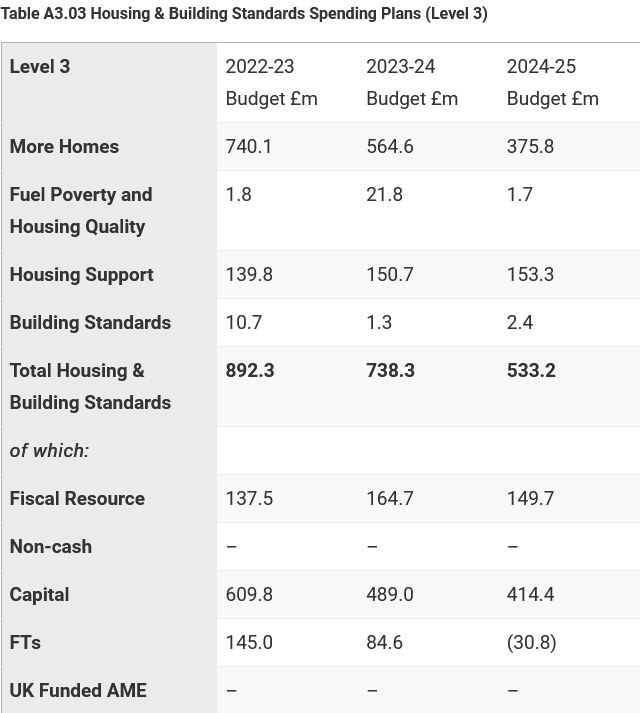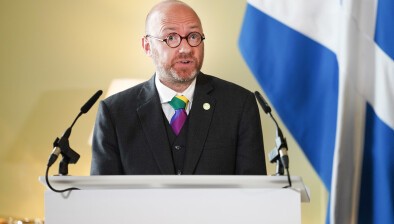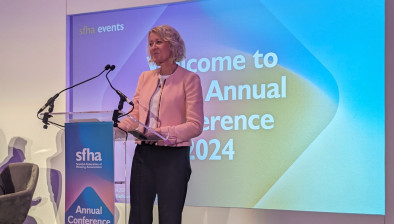Budget: Sector hits out at ‘damaging’ housing and planning cuts

The Scottish Government’s plan to cut its housing budget by around £200 million next year will have “devastating” consequences for social housing supply and homelessness support, ministers have been warned.
Unveiled yesterday by deputy first minister and cabinet secretary for finance Shona Robison MSP, the 2024-25 Scottish Budget has proposed a reduction in spending on housing and building standards from £738m this year to £533m next year. It includes a cut of almost £190m to housebuilding.
The budget for building social homes will be slashed by almost £200m for 2024-25 – a reduction of 26%, while spending on planning will also be cut by 43% under the plans.
Home building trade body Homes for Scotland raised concerns that the level of cuts to housing and planning will act as a deterrent to investment.
Chief executive Jane Wood said: “We were prepared for a tough budget but, in the context of three local authorities having declared housing emergencies this year, the level of cuts we have seen across both the Affordable Housing Supply Programme and the planning system this afternoon is quite shocking.
“Coming on the back of last week’s statistics showing that the chronic undersupply of housing is intensifying, this not only threatens Scotland’s social wellbeing by perpetuating housing inequality but also its economic success and the transition to net zero.
“As we continue to highlight, private and affordable housing delivery are interconnected. With 30 per cent of affordable housing generated by the private sector, the more homes for sale that can be built, the more affordable homes will be available. Given the planning system is already on its knees, a cut of the magnitude announced today will serve only to increase delay and cost and do nothing to encourage crucial private sector investment.
“Indeed, we have spent a large part of this year flagging concerns to the Scottish Government that its policies are acting as a deterrent to investment. There is clear evidence now on the impact that the increasingly divergent policies are having on the attractiveness of Scotland as a place to invest in, these budget implications do nothing to mitigate that nor to ensure the housing needs of Scotland’s people are met.”
The Scottish Federation of Housing Associations (SFHA) warned that the huge funding cut will put the Scottish Government’s affordable housing programme at serious risk.
Highlighting the vital importance of the Affordable Housing Supply Programme (AHSP) in allowing housing associations to deliver new homes and meet the Scottish Government’s target of building 110,000 affordable homes by 2032, the SFHA warned that the cut will also have serious consequences for those impacted by Scotland’s housing crisis.
SFHA chief executive Sally Thomas said: “Today’s budget is an absolute hammer blow for tackling homelessness and poverty across Scotland and will have long-lasting consequences for the nearly 250,000 people throughout Scotland stuck on a waiting list for a social home, as well as for existing tenants and the housing associations which support them.
“More social homes quite simply mean fewer children growing up in poverty. Over 20,000 children in Scotland are kept out of poverty because of social housing. It is therefore devastating that the First Minister would abandon his defining mission to tackle poverty by failing to support people who need social homes. It is the worst possible budget at the worst possible time.”
Callum Chomczuk, director of CIH Scotland, described the cash terms cut in the more homes budget as “devastating” for Scotland’s social housing supply programme”, adding that the budget does not address the pressures faced by the country’s homelessness services and fails to recognise the ongoing housing crisis.
“Before today’s budget announcement the housing and homelessness sector was united,” he added. “We collectively called for the Scottish Government to use every tool available to tackle the housing crisis. We wanted to see a step-change investment that would help address the climate emergency, cut poverty and catalyse economic growth, all by keeping us on track to deliver 110,000 social and affordable homes by 2032.
“We recognise and welcome the cash term increase to the discretionary housing payments budget and support for continuing with Rapid Rehousing Transition Plans to prevent homelessness but overall the budget today fails to recognise, let alone meet the challenge of Scotland’s housing crisis.”

Source: The Scottish Government 2024-25 Scottish Budget
Mr Chomczuk said: “With new house building starts massively down compared with 12 months ago, construction costs rising and three of Scotland’s local authorities declaring housing emergencies this year, today was the moment to address the crisis. Earlier this year the Scottish Housing Regulator warned of systemic failure in our homelessness services. But today’s announcement does not address the risk and pressures faced by local authority housing and homelessness services. The cash terms cut in the more homes budget of around £200m compared with 23-24 is devastating for our social housing supply programme and our plans to end homelessness.
“Earlier this summer the Scottish Government accepted the recommendations of an independent report calling for the full funding of the delivering of 110,000 homes by 2032, today’s budget moves us further away from this. We need the Scottish Government to urgently review the viability of its 110,000 affordable homes by 2032 target and consider what funding and support is needed to increase sector capacity immediately to deliver the affordable homes Scotland needs.”
David Bookbinder, the director of the Glasgow and West of Scotland Forum of Housing Associations (GWSF), added: “It’s distressing to see this level of cuts to a programme that was already set to miss its 110,000 homes target by tens of thousands. That target has been drowning for some time and is now dead in the water. We need to see Ministers stop referring to it as this just insults the sector’s intelligence.
“We note that cuts to ‘Financial Transactions’ (65%) are greater than the cuts to capital (14%), which means the non-social housing part of the new supply programme takes the brunt. But at the current time, any cut to the social housing programme is incredibly disappointing, and awful timing.
“It’s especially painful in the context of the First Minister’s decision to freeze council tax – a decision that has to be funded from cuts elsewhere and which doesn’t even benefit our poorest households. And it was one decision which can’t be blamed on Westminster: in fact it saves Westminster money.”
Lori McElroy, chair of the Existing Homes Alliance, added: “We recognise the extremely challenging financial environment and welcome that the critical role of energy efficiency and fuel poverty programmes has been recognised. However, this budget does not scale up funding to the levels needed to support a just transition to warm homes and clean heat, so it’s now more important than ever that the Scottish Government spends money wisely. This should include increasing access to advice and support services, fully meeting costs for people at risk of fuel poverty and supporting supply chains to invest in their businesses to meet growing demand.”
Impact of tax and investment
Timothy Douglas, head of policy and campaigns at Propertymark, said the Scottish Government’s budget fails to recognise the impact of tax and investment on affordability and demand for homes.
he added: “There is a huge demand crisis in the private rented sector that the Scottish Government is failing to address. Scotland remains the most expensive place to invest in the private rented sector across the UK and we need to see more support through grant funding to help agents and their landlords to improve the energy efficiency of homes.
“The cost-of-living legislation has raised costs for renters and it’s now imperative that the Scottish Government carry out a review of all taxes impacting private landlords and the wider property sector in order to introduce policies that help meet the demand from renters and tackle the housing emergency.”
David Alexander, chief executive of DJ Alexander Ltd, said: “The Scottish budget was a missed opportunity to address some of the key issues affecting the housing sector in Scotland. There is to be a £550m investment in the supply programme for rent, social rent and affordable home ownership but given the scale of demand and the waiting list for social housing this, although a large amount of money, is still not sufficient to address the issue. In many local council areas, the wait for social housing is measured in years and sometimes in decades. This is an issue requiring sustained major investment over a prolonged period and the current announcement is welcome but clearly not going to meet demand in the next five to ten years.”
“There is no change to Land and Buildings Transaction Tax (LBTT) which makes Scotland much more expensive to buy property at a very early stage. First time buyers are more punitively hit than anywhere else in the UK with tax starting at £175,000 compared to £425,000 in England and Wales. While any property over £325,001 attracts a 10% charge which doesn’t occur south of the Border until properties cost more than £925,000.”
Mr Alexander added: “There is an additional £358m provided to accelerate the installation of clean heating systems but given that this represents just over 1% of the anticipated £33bn costs of the implementation of these energy efficient products it is clear that the homeowner is still being asked to stump up for the Scottish government’s green ambitions.
“With higher personal taxes than anywhere else in the UK and higher house purchase costs it is hard to see how these policies make Scotland an attractive place to live and work. This budget was an opportunity to encourage more housebuilding, to address serious shortages in the number of social housing available, and to attract higher earners to live and work here. Unfortunately, I think that it has been a missed opportunity on all counts.”


















